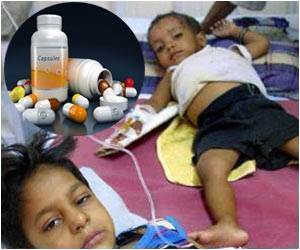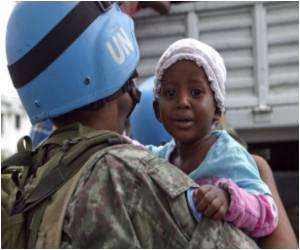UN peacekeepers from Nepal brought in Haiti's devastating cholera outbreak, according to an expert report submitted to the French foreign ministry.

"The source of the infection came from the Nepalese camp," the source told AFP, speaking on condition on anonymity as he was not authorised to discuss a report that has not yet been made public.
"The starting point has been very precisely localised," he said, pointing to the UN base at Mirebalais on the Artibonite river in central Haiti.
"There is no other possible explanation given that there was no cholera in the country, and taking into account the intensity and the speed of the spread and the concentration of bacteria in the Artibonite delta," he said.
"The most logical explanation is the massive introduction of faecal matter into the Artibonite river on a single occasion," the source added.
The United Nations, which has faced violent protests in Haiti over its alleged role in an outbreak that has already killed 2,000 people and made 90,000 sick, insists there is no evidence that its troops were to blame.
Advertisement
"From the outbreak of the epidemic, France sent to Haiti at the request of the Haitian health ministry one of its best cholera specialists, Professor Piarroux, a head of department in Marseille's public hospitals," he said.
Advertisement
Piarroux discussed his report in an interview with AFP last month. He did not directly blame the Nepalese, but said the cholera was from abroad.
"It started in the centre of the country, not by the sea, nor in the refugee camps. The epidemic can't be of local origin. That's to say, it was imported," he said, shortly after his return from Haiti.
Haitian officials say the first cases of cholera, a waterborne illness, broke out on the banks of the Artibonite river, downstream of the UN base.
Last month, Edmond Mulet, head of the United Nations mission in Haiti, said no UN soldier, police officer nor civilian official had tested positive for cholera, and he defended the Nepalese, who have been the target of protests.
All samples taken from the latrines, kitchens and water supply at the suspect Nepalese camp have proved negative, Mulet said.
"There is no scientific evidence that the camp at Mirebalais is the source of this epidemic," he said, complaining of "a lot of disinformation, a lot of rumours around this situation."
But Piarroux -- who works at the University of the Mediterranean in Marseille -- told AFP that the outbreak was not linked to the earthquake devastation, and could not have come from a Haitian environmental source.
"The epidemic exploded in an extremely violent way on October 19, with several thousand cases and several hundreds deaths after many people drank the water of the Artibonite delta," he said.
The professor said the world had not seen cholera spread so quickly since an outbreak in Goma, in eastern Congo, in 1994. "We've had more than 70,000 cases, and we could easily see them hit 200,000," he warned.
Cholera is caused by bacteria spread in contaminated water or food, often through faeces. If untreated, it can kill within a day through dehydration, with the old and the young the most vulnerable.
Source-AFP











